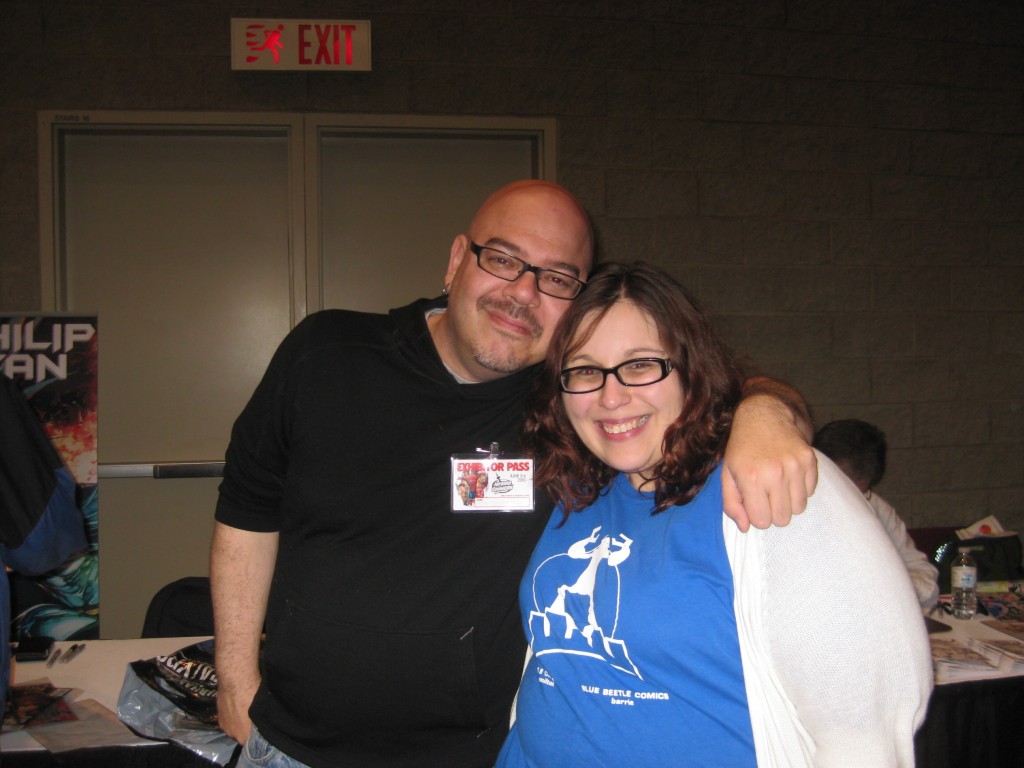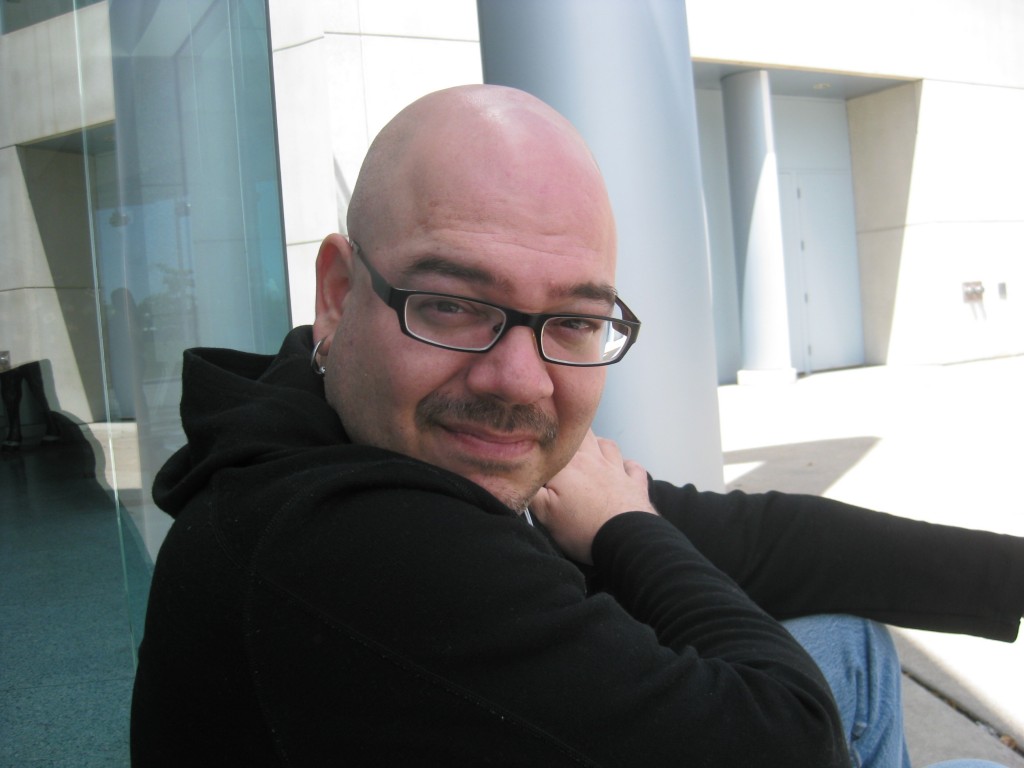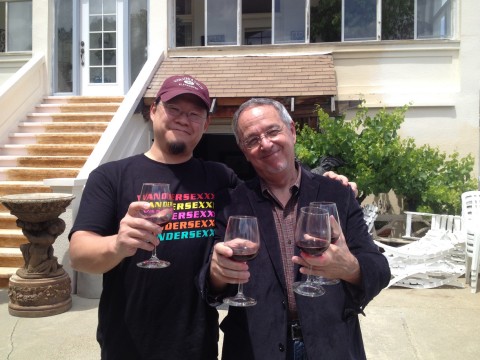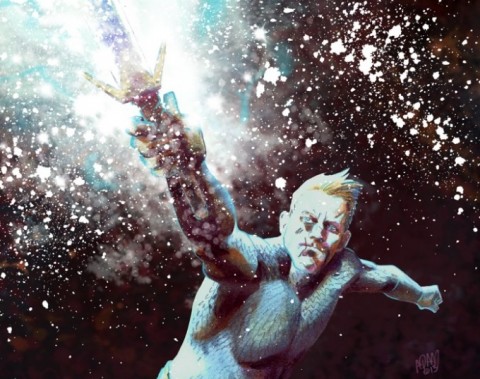About a month ago, at the Hobbystar Comicon Fan Appreciation event, I had the opportunity to sit down and interview Greg Rucka:
Shelley Smarz: So, first I want to say, as a comic book scholar, as a fan, and as a feminist, I just want to say thank you for writing strong women so well.
Greg Rucka: Oh, thank you.
Shelley Smarz: Any secrets to people—
Greg Rucka: What, to writing strong women well?
Shelley Smarz: Yes. And not making them a caricature.
Greg Rucka: Yeah, They’re not strong women, they’re people…and they happen to be women. I mean…. [Laughs]
Shelley Smarz: They happen to have boobs.
Greg Rucka: Yeah. Well, no. No, that makes it seem like…the problem is that a lot of people write strong women as guys with tits and that’s not, that’s clearly not the secret. The secret, if there is a secret, is each character is their own person and gender is an element of character as is, you know, religious background, an education. It goes on and on and on. So, I don’t know. It’s something that I’d like to think is across the board. I try to do well by whatever character I’m writing or whoever it is. [Pause] I enjoy writing female characters. There are characters that I love to write. A lot of those characters are female characters, so I just try to do well by whoever it is.
Shelley Smarz: Okay, yeah. I just have to say it’s refreshing, one, not to have what you said, “oh she’s just a guy with tits,” and it’s also refreshing that you don’t, for a lack of a better word, pussy-foot around the notion that you can’t have anything bad happen to a female character.
Greg Rucka: Though I’ve been accused of being a misogynist because of that as well.
Shelley Smarz: Yes.
Greg Rucka: Look, especially in stories about heroism and adventure stories, the adversary has to be worthy of the hero and that means you have to kick the snot out of the hero, and they have to take a punch. They have to be willing to take the punch, and again, it’s part and parcel. My experience, frankly, is that most of the women I’ve met are tougher than most of the men, anyway.
Shelley Smarz: [Laughs] that’s been my experience as well. Just to go off on a different tangent, I’ve noticed that comic books have moved from the long form type of storytelling to more event-driven, immediate gratification type storylines. Part of that can be accounted for by looking at how the big push in the industry is for trades.
Greg Rucka: Yeah, I suppose you could argue that there is a writing-for-the-trades element, but events sell. That’s why publishers do events.
Shelley Smarz: But then there is also event fatigue, which I think a lot of people have.
Greg Rucka: People may have event fatigue but they’re still buying the things.
Shelley Smarz: True
Greg Rucka: I’ve talked to many a fan who has event fatigue and yet they still buy everything. So, you can say you have event fatigue all you like, but not until you stop buying it are the publishers going to stop doing them.
Shelley Smarz: I have to say, I really appreciate the subtle storytelling…that you have a lot more to say, and going along with that, the end of Batwoman. It went out with not a bang but a whimper. Would you ever think of returning to that?
Greg Rucka: I loved writing that character. I’m very fond of Kate. I don’t know what JH [Williams] and Hayden [Blackman] have planned. I have no idea. I’m not working for DC now. Nobody at DC talks to me. I’m working on my own things at this point. So, you know, I’m too old to ever say never. [Laughs] A funny enough phrase, but I tried very hard not to burn any bridges. It was just time for me to step away and focus on some other things.
Shelley Smarz: Okay. Speaking of those other things, I’m going to ask this first because I’m really curious. Do you have any idea when the next Queen and Country is coming out?
Greg Rucka: Well, the new novel comes out at the end of October and it’s called The Last Run, and it’s a Queen and Country novel.
Shelley Smarz: Okay.
Greg Rucka: I am about 95% certain that I’m going to start series two of Queen and Country shortly thereafter. Right now, the goal is to make sure that Stumptown is up and running and healthy before devoting too much time or energy to Queen and Country. But yeah, there are plans for a second series. How that second series is going to roll out, as maybe OGNs as opposed to floppies, we’re still talking about the options. [In a silly voice] I’m in a place where I’m willing to get back to work on that.
Shelley Smarz: Excellent
Greg Rucka: I have no idea why I did a silly voice there and I apologize.
Shelley Smarz: That’s okay [Laughs].
Greg Rucka: [Laughs] Long day in the convention hall.
Shelley Smarz: [Laughs] I was going to offer if you wanted to move this to a bar.
Greg Rucka: [Laughs] It’s okay. You’re going to have to get back in there, so…
Shelley Smarz: Stumptown is obviously heavily influenced by the detective genre—
Greg Rucka: It is detective genre [Laughs]
Shelley Smarz: I guess what I’m trying to say is, were there key works, key authors, key titles, that you were so influenced by that you can name them off the top of your head?
Greg Rucka: I started as a writer because I wanted to write private eye fiction. That’s what the Kodiak novels initially were. They were PI novels. I would run home from school to catch the opening of the Rockford Files. I’ve said this in countless interviews.
Shelley Smarz: I love Rockford Files.
Greg Rucka: I mean Stumptown is my love letter to the Rockford Files. That’s what it is. It’s the comic book series, inevitably that’s going to be written by a kid who watched Rockford and Magnum P. I. growing up and thought they were the greatest things in the world!
Shelley Smarz: They still are the greatest things in the world.
Greg Rucka: I read very wide and very deep in the genre. There was a while where I thought I was going to be doing doctorial work on analysis of the American private investigator as a means of social commentary.
Shelley Smarz: That would have been really interesting.
Greg Rucka: You get me talking on that and I can go for hours about the nature of the genre and how it works and what keeps returning in the form, and so on. Stumptown was misidentified by a lot of people as crime-noir at the start and it’s not. It never was. It is a private eye story, and it is a private eye story done very much in the mould of the Rockford Files. It is meant to be a character oriented work. Like much of Rockford, and even frankly, much of Magnum and other shows of that ilk, the mysteries were almost secondary to the people involved. So, that’s what I’m very actively pursuing there.
Shelley Smarz: I’m not sure if you want to answer this because it’s kind of a ‘burn your bridges’ type of question. One of the most frustrating things for me, because I really love Wonder Woman, is there have been a lot of great writers who have taken up the mantel and written her, and it almost seems as though…DC has different ideas?
Greg Rucka: I don’t think this is a ‘burn your bridges’ thing. I think anyone who pays any attention knows they don’t know what to do with the character. They keep trying different things and for one reason or another, either because situation or the team, or whatnot, it doesn’t click. She’s very…she’s not an easy character, that’s number one. And number two, I think there’s this desire on the part of DC. They want to see here, and I’d love it, they want to see her with the numbers you get on a Batman or a Superman [comic] regularly. The problem is that there is a lot of prejudice that the character just automatically engenders…and that’s a tough uphill battle. How much time do you give something to see if it works before you decide it’s not working and you’re going to try again?
Shelley Smarz: Yeah. You could see that in the 70s when they rebooted her and took away all her powers and she became a…kung-fu master?
Greg Rucka: Yeah, that’s the second time this weekend someone has brought that up and the thing that’s important to remember in that is, yeah, that’s what they were trying to do. They were trying to reinvent in a way that would make it stick. Dennis [O’Neil] did not go in there, “Ah ha! How can I write the most antifeminist Wonder Woman possible?” He’s on record as saying if he thought about what he was doing, he never would have done it. What they were trying to do with her there was go “Well, you know what? This version doesn’t seem to work. Let’s try a more Diana Rigg, Steed and Peel-ish approach.” I do think the character is a very very difficult character and the biggest problem I think there is there is that…people misidentify the problem over and over again. They misidentify it as “oh, nobody can relate to her because she’s perfect,” which is think is bullshit. They say, “Oh, nobody can relate to her because she’s not really human,” which I think is bullshit. The inherent flaw, if there is a flaw, on the character is that she is created in an historical moment that shifts. Feminism is a shifting concept and she is inherently a political character. If you are a corporate entity like DC/Warner Brothers, that is immediately problematic. The options seem to be, either write her as Superman but female, or try to embrace what makes her Wonder Woman, and I think that for the most part the attempts to embrace that get met on a corporate level with a certain resistance. They don’t get it. And I do think, and this is across the board, there is a dangerous tendency to say, well, if that’s not the character as I…if these aren’t the stories I want to read on a corporate level, then therefore they are not stories of merit, and I think that’s erroneous. If you’re publishing 70/80 books a month there’s got to be some room in the line to but out some stuff that it may not personally scratch your back, but it’s clearly scratching somebody else’s.
Shelley Smarz: I’m going to go off on a more human interest type thing [Both laugh]. What is on your bookshelf right now, or on your bedside table?
Greg Rucka: I’ve been reading Richard Morgan right now. I just finished Altered Carbon and I’m reading Fallen [Broken] Angels. I believe that’s the title. I’ve been reading a lot of the Patrick O’Brian, Aubrey Maturin novel, so…
Shelley Smarz: Any comics on the bedside table?
Greg Rucka: Not right now. I needed to step away [Laughs]. Very badly, I needed to step away. It’s really only been two months of rehab so… [Laughs]. I’m starting to rediscover a love of the genre. It burns you out after awhile. For me, I was starting to get really burnt out.
Shelley Smarz: So if you were looking back, was there a character that you really really wanted to write, and what would you do with them?
Greg Rucka: I’ve been remarkably lucky. I mean really, I’ve been unreasonably fortunate. I’ve gotten to write just about every single big character that’s come along. There are characters that I would have like to have done more with, but I think if there was any one character that I wish I had a chance to work on it would probably be Captain America. I’d like to do something with Captain America and I would really like to actually, if we’re talking across the board, I got to flirt a bit with the Black Widow stuff, but I didn’t really get to do anything substantial there, and that would have been fun. At DC, the beautiful thing about the opportunities I was given there is that I was really allowed to chase things down. I’m trying to think. There aren’t many characters that I haven’t gotten a crack at that I really wanted a crack at. I recognize, really, that’s an incredibly fortunate place to be. I’m trying to think. I’m not sure there are. There are characters I’d happily write again. I’d love to write Batwoman again. I’d love to write Batman again. I’d happily write Wonder Woman again, things like that. I would happily write Electra again. I quite liked writing Electra. I suppose, given the opportunity, the right place, the right time; it could be interesting to try something like Daredevil or Moon Knight. I’m very content, with regards to that. Like I said, just crazily fortunate in the opportunities I’ve been given.
Shelley Smarz: In my own research, as well as doing a Masters in comic books I’m completing my MBA, so I can have some real world skills to offer people [both laugh]. One of my projects was researching consumption of comics by women.
Greg Rucka: And what did you discover?
Shelley Smarz: Even in my own personal experience, even ten years ago, I was pretty much the only chick here who was here for the comics and not here with their boyfriend. This con has been awesome because there have been a lot of women fans.
Greg Rucka: A lot more women here.
Shelley Smarz: Based off of the sales and demographic data that I could find over 90% of the readership of superhero comics is men. How do you think we could rectify that? How do we get more women to read comic book and graphic novels? There was a big surge in manga and graphic novel consumption that’s kind of petered off.
Greg Rucka: Really, has it? I’m not up on market data.
Shelley Smarz: Based off the latest manga sales, it’s dropped significantly from I think 2005 and then this year and market analysts are saying that it’s because of Twilight and things like that. That pre-teen market that was consuming manga is now turning to other things, and they’re not able to sustain the readership into adulthood, unlike they can in Japan. It’s a very interesting quandary.
Greg Rucka: I think a lot of comics, you walk into a comic book store and I think if you’re a woman, there are a lot of books simply on the basis of their cover say you’re not welcome. I think we need to redefine what sexy is, number one, and stop going for the lowest common denominator in that. I think that the first thing that impacts when you pick up a comic is the visual and I think that the second thing that happens is the story. Our visuals need to be less exclusive and our stories need to be more inclusive. If I knew the answer, a simple magical wand fix, I’d have done it. Simply because, and it has nothing to do with a political agenda at all, it’s got to do with survivability of the industry. I want comics to survive. I’d be interested, on the same token, you were talking about the percentage of the readership that was male verses female, I’m curious how much of the percentage of the readership is under 16 verses over 30 at this point. We were talking about events before. These are not events that bring in new people. These are events that service and existing audience. How do we get a new audience in?
Shelley Smarz: That’s one thing that I really appreciated about your DC work, like Checkmate and Batwoman. It was accessible to me without having to constantly go to Wikipedia and say, ‘what are they referencing?’
Greg Rucka: [Laughs] Who are these people? One of the things that JH [Williams] and I and the editor on the book, Michael Siglain, worked very very hard on for the Batwoman issues of Detective [Comics], was to make sure that it would be accessible and enduring. We went to great length to avoid at any point saying Dick Grayson is Batman as opposed to Bruce Wayne. We didn’t want it to tie to that because we didn’t want it to be something that in ten years would pick up and be like, “what the hell?” That was relevant for the story and while there is a delight to be found in continuity that fits together like an elegant jigsaw-puzzle, there’s also a place for books that can stand alone. I do think that one of the things we’ve seen less and less, really since 2003/2004, is books that can do that. And, there’s been a reason for that, and I really think it started with Infinite Crisis. It started with building an event that tied very well throughout the line, and then sort unified into this thing that was this big event, and there were big numbers on it, and people went ‘Woo! Wow! Look!’ Guess what? If it works, let’s do it again, and again, and again, and we’re going to keep doing it until we find the next thing that works. And it goes back to event fatigue. People keep buying it.
Shelley Smarz: I think back to when I was working in a local comic book shop, Wednesday Comics, or the weekly before that, we saw the numbers. We compared the numbers to 52, and then Countdown, and then Trinity, and then Wednesday Comics, and they dropped significantly, until about 3 people were getting Wednesday Comics compared to 65 getting—
Greg Rucka: And Wednesday Comics were gorgeous. They were beautifully done.
Shelley Smarz: They were, and that over-sized hardcover? I’m looking at it and going I want this but I have nowhere to put it. My bookshelves are too small.
Greg Rucka: Yeah, find me a bookshelf that’ll fit that thing.
Unfortunately, at that point, the blasted recorder died (it’s a tad persnickety on the best of days, on the worst, well, I’ll leave that to your imagination). Luckily, I had my camera on-hand and was able to tape Greg’s response to the final question, which asked him his opinion on the iPad and how it was going to affect the industry – if at all.
So, Greg, thanks again for being a pretty awesome guy to talk with. Of all the interviews that I’ve done in the last little while, this was definitely one of the most enjoyable I’ve done (my little fangirl heart is still a flutterin’!). Also, thanks for the picture!

Shelley Smarz is currently a (struggling to be paid) intern struggling to finish her MRP. She can already tell that it’s going to be a Red Bull, coffee, coffee, Red Bull, coffee, Red Bull, coffee…VODKA! kind of day. In that case, if you’ll please leave a detailed message, she’ll get back to you… Well, come to think about it, December’s looking pretty good….




